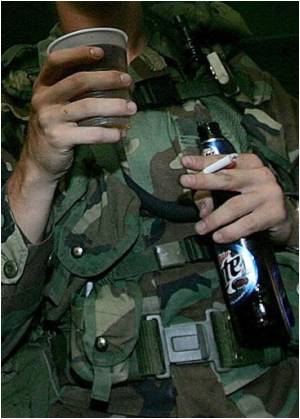
Since the beginning of the war in Iraq in 2003, U.S. military authorities have been confronted with a big dilemma: the excessive consumption of alcohol, combined with the shortage of therapists. According to a study dated in Washington and conducted by the Mexican agency Notimex, the number of soldiers “enrolled in treatment after being diagnosed with alcohol problems” has increased by 56 percent.
“The Army needs to double its staff of substance-abuse counselors to handle the soaring numbers of soldiers seeking alcohol treatment,” said Gen. Peter Chiarelli in an interview with USA Today.
Chiarelli, the U.S. Army’s vice chief of staff, said that 300 more “counselors” are needed “to meet the demand,” as well as to cut wait times between consults and offer evening and weekend services.
According to data released by Notimex, last year 9,199 U.S. soldiers “enrolled in treatment” after being diagnosed with alcohol abuse problems. Overall, the number of soldiers who sought various types of counseling exceeds 16,300.
USA Today stated that “in 2003, when the Iraq war started,” almost 6,000 enrolled to obtain some type of therapy or treatment, and a little more than 11,000 “sought counseling.”
Alcoholism seems to be the outlet for those in uniform who have participated in various imperial conflicts or are stationed in military bases, country borders or are maintained by the U.S. administration in different nations around the world.
The same news agency reported that in 2009 then-Secretary of the Army Pete Geren solicited Chiarelli to look for ways to reduce the Army’s rate of suicide. It seems that the top military leaders have identified substance abuse as a matter in many deaths, especially alcohol, and have reported 160 deaths in the last 12 months.
Statistics reveal that among prohibited substances, the consumption of higher doses of alcohol is predominant: 85 percent of cases under treatment for substance abuse are related to alcohol.
The absence from their homeland, the continued stay on foreign lands, aggression and other ailments seem to be the principal factors that influence soldiers who seek to escape through high alcohol consumption.

Leave a Reply
You must be logged in to post a comment.